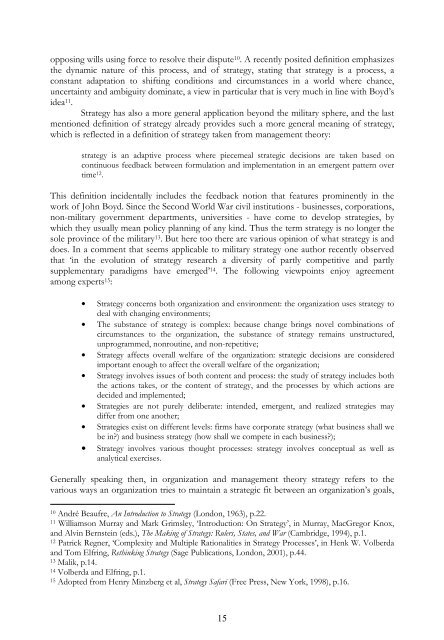Science, Strategy and War The Strategic Theory of ... - Boekje Pienter
Science, Strategy and War The Strategic Theory of ... - Boekje Pienter
Science, Strategy and War The Strategic Theory of ... - Boekje Pienter
Create successful ePaper yourself
Turn your PDF publications into a flip-book with our unique Google optimized e-Paper software.
opposing wills using force to resolve their dispute 10 . A recently posited definition emphasizesthe dynamic nature <strong>of</strong> this process, <strong>and</strong> <strong>of</strong> strategy, stating that strategy is a process, aconstant adaptation to shifting conditions <strong>and</strong> circumstances in a world where chance,uncertainty <strong>and</strong> ambiguity dominate, a view in particular that is very much in line with Boyd’sidea 11 .<strong>Strategy</strong> has also a more general application beyond the military sphere, <strong>and</strong> the lastmentioned definition <strong>of</strong> strategy already provides such a more general meaning <strong>of</strong> strategy,which is reflected in a definition <strong>of</strong> strategy taken from management theory:strategy is an adaptive process where piecemeal strategic decisions are taken based oncontinuous feedback between formulation <strong>and</strong> implementation in an emergent pattern overtime 12 .This definition incidentally includes the feedback notion that features prominently in thework <strong>of</strong> John Boyd. Since the Second World <strong>War</strong> civil institutions - businesses, corporations,non-military government departments, universities - have come to develop strategies, bywhich they usually mean policy planning <strong>of</strong> any kind. Thus the term strategy is no longer thesole province <strong>of</strong> the military 13 . But here too there are various opinion <strong>of</strong> what strategy is <strong>and</strong>does. In a comment that seems applicable to military strategy one author recently observedthat ‘in the evolution <strong>of</strong> strategy research a diversity <strong>of</strong> partly competitive <strong>and</strong> partlysupplementary paradigms have emerged’ 14 . <strong>The</strong> following viewpoints enjoy agreementamong experts 15 :• <strong>Strategy</strong> concerns both organization <strong>and</strong> environment: the organization uses strategy todeal with changing environments;• <strong>The</strong> substance <strong>of</strong> strategy is complex: because change brings novel combinations <strong>of</strong>circumstances to the organization, the substance <strong>of</strong> strategy remains unstructured,unprogrammed, nonroutine, <strong>and</strong> non-repetitive;• <strong>Strategy</strong> affects overall welfare <strong>of</strong> the organization: strategic decisions are consideredimportant enough to affect the overall welfare <strong>of</strong> the organization;• <strong>Strategy</strong> involves issues <strong>of</strong> both content <strong>and</strong> process: the study <strong>of</strong> strategy includes boththe actions takes, or the content <strong>of</strong> strategy, <strong>and</strong> the processes by which actions aredecided <strong>and</strong> implemented;• Strategies are not purely deliberate: intended, emergent, <strong>and</strong> realized strategies maydiffer from one another;• Strategies exist on different levels: firms have corporate strategy (what business shall webe in?) <strong>and</strong> business strategy (how shall we compete in each business?);• <strong>Strategy</strong> involves various thought processes: strategy involves conceptual as well asanalytical exercises.Generally speaking then, in organization <strong>and</strong> management theory strategy refers to thevarious ways an organization tries to maintain a strategic fit between an organization’s goals,10 André Beaufre, An Introduction to <strong>Strategy</strong> (London, 1963), p.22.11 Williamson Murray <strong>and</strong> Mark Grimsley, ‘Introduction: On <strong>Strategy</strong>’, in Murray, MacGregor Knox,<strong>and</strong> Alvin Bernstein (eds.), <strong>The</strong> Making <strong>of</strong> <strong>Strategy</strong>: Rulers, States, <strong>and</strong> <strong>War</strong> (Cambridge, 1994), p.1.12 Patrick Regner, ‘Complexity <strong>and</strong> Multiple Rationalities in <strong>Strategy</strong> Processes’, in Henk W. Volberda<strong>and</strong> Tom Elfring, Rethinking <strong>Strategy</strong> (Sage Publications, London, 2001), p.44.13 Malik, p.14.14 Volberda <strong>and</strong> Elfring, p.1.15 Adopted from Henry Minzberg et al, <strong>Strategy</strong> Safari (Free Press, New York, 1998), p.16.15
















